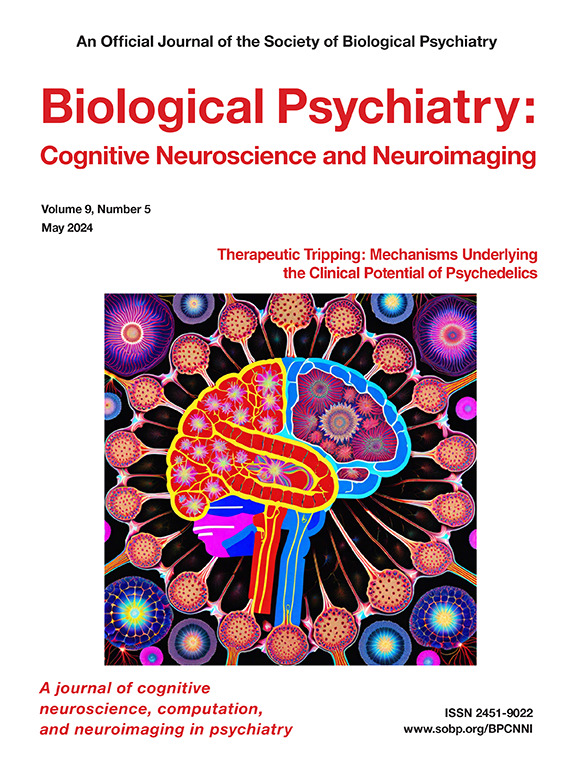将线粒体功能障碍、神经递质、神经网络异常和躁狂症联系起来:阐明生酮饮食对躁郁症治疗效果的神经生物学机制。
IF 5.7
2区 医学
Q1 NEUROSCIENCES
Biological Psychiatry-Cognitive Neuroscience and Neuroimaging
Pub Date : 2025-03-01
DOI:10.1016/j.bpsc.2024.07.011
引用次数: 0
摘要
人们对将生酮饮食作为双相情感障碍(BD)治疗方法的兴趣日益浓厚,有关生酮饮食疗效的传闻和小型病例研究报告令人鼓舞。然而,饮食诱导酮病可能改善双相情感障碍症状的神经生物学机制仍有待确定,尤其是在狂躁和躁狂状态下--这是双相情感障碍的决定性特征。因此,确定这些机制将为指导个性化干预提供新的标记,并为 BD 患者的新型治疗发展提供目标。在这篇重要综述中,我们将介绍最近的研究发现,其中强调了 BD 两种类型的神经生物学异常:1)线粒体功能障碍;2)神经递质和神经网络功能异常。因此,我们将把这些异常与 BD 患者的狂躁/躁狂和抑郁联系起来,然后描述生酮饮食可能对 BD 患者产生有益影响的生物学基础。在综述的最后,我们介绍了未来可用于阐明生酮饮食对 BD 治疗效果的神经生物学基础的方法。这样做可以为识别对生酮饮食反应良好的个体提供标志性预测指标,并为 BD 的新型治疗开发提供神经靶点。本文章由计算机程序翻译,如有差异,请以英文原文为准。
Linking Mitochondrial Dysfunction, Neurotransmitter, and Neural Network Abnormalities and Mania: Elucidating Neurobiological Mechanisms of the Therapeutic Effect of the Ketogenic Diet in Bipolar Disorder
There is growing interest in the ketogenic diet as a treatment for bipolar disorder (BD), and there are promising anecdotal and small case study reports of efficacy. However, the neurobiological mechanisms by which diet-induced ketosis might ameliorate BD symptoms remain to be determined, particularly in manic and hypomanic states—defining features of BD. Identifying these mechanisms will provide new markers to guide personalized interventions and provide targets for novel treatment developments for individuals with BD. In this critical review, we describe recent findings highlighting 2 types of neurobiological abnormalities in BD: 1) mitochondrial dysfunction and 2) neurotransmitter and neural network functional abnormalities. We link these abnormalities to mania/hypomania and depression in BD and then describe the biological underpinnings by which the ketogenic diet may have a beneficial effect in individuals with BD. We end the review by describing approaches that can be employed in future studies to elucidate the neurobiology that underlies the therapeutic effect of the ketogenic diet in BD. Doing this may provide marker predictors to identify individuals who will respond well to the ketogenic diet, as well as offer neural targets for novel treatment developments for BD.
求助全文
通过发布文献求助,成功后即可免费获取论文全文。
去求助
来源期刊

Biological Psychiatry-Cognitive Neuroscience and Neuroimaging
Neuroscience-Biological Psychiatry
CiteScore
10.40
自引率
1.70%
发文量
247
审稿时长
30 days
期刊介绍:
Biological Psychiatry: Cognitive Neuroscience and Neuroimaging is an official journal of the Society for Biological Psychiatry, whose purpose is to promote excellence in scientific research and education in fields that investigate the nature, causes, mechanisms, and treatments of disorders of thought, emotion, or behavior. In accord with this mission, this peer-reviewed, rapid-publication, international journal focuses on studies using the tools and constructs of cognitive neuroscience, including the full range of non-invasive neuroimaging and human extra- and intracranial physiological recording methodologies. It publishes both basic and clinical studies, including those that incorporate genetic data, pharmacological challenges, and computational modeling approaches. The journal publishes novel results of original research which represent an important new lead or significant impact on the field. Reviews and commentaries that focus on topics of current research and interest are also encouraged.
 求助内容:
求助内容: 应助结果提醒方式:
应助结果提醒方式:


